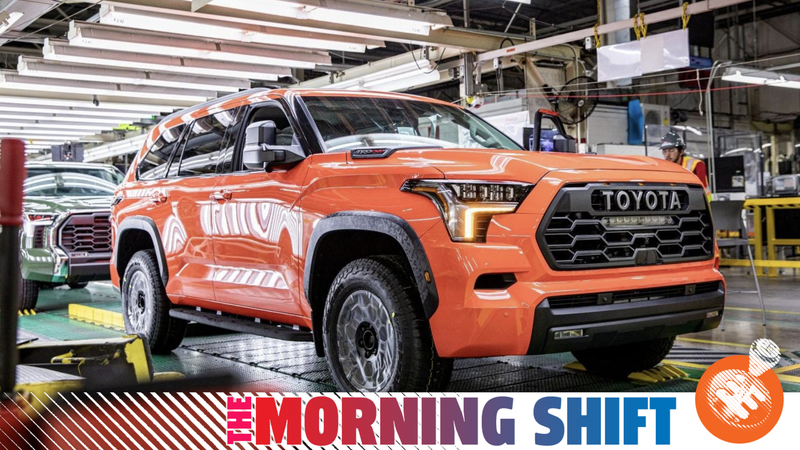Toyota Finally Admits It Won't Make Its Full-Year Production Target

The global chip shortage and supply chain issues mean Toyota is about to miss the mark in terms of production, a new report predicts top automakers could invest nearly $1.2 trillion in EVs by 2030, and Tesla’s lithium refinery plans in Texas get the green light. Those stories and more in this freaky Friday edition of The Morning Shift for October 21, 2022.
1st Gear: Toyota Will Miss The Mark
Toyota has announced it is cutting its fiscal-year production forecasts because of supply chain issues and the global semiconductor chip shortage. This long-awaited move comes after months of the company putting it off, even though it seemed a bit inevitable.
Read more
The 2022 Civic Si Sure Seems To Make More Power Than Honda Says
You Can Now Sleep In A Retired Semi Truck Trailer Tiny House
The company has reportedly remained tight-lipped on its new production target for the fiscal year, which ends on March 31, 2023. New guidance could reportedly come at next month’s fiscal second-quarter earnings meeting. From Automotive News:
Toyota had stubbornly clung to its goal of churning out 9.7 million vehicles in the current fiscal year, even as it repeatedly cut monthly plans amid global supply chain upheaval.
[...]
As recently as September, Toyota had said it wanted to manufacture 900,000 vehicle a month from September through November, as it raced to recoup lost volume from earlier in the year. But it later cut September output to 850,000 and October’s output to 800,000.
In a statement issued Oct. 21, the automaker said November total would also be lowered to 800,000, covering 250,000 units in Japan and 550,000 overseas.
Suspensions in Japan will affect 11 lines in eight plants, out of 28 lines in 14 plants.
Affected nameplates include the Corolla, Corolla Cross, RAV4, Camry, Crown, Land Cruiser Prado and 4Runner, as well as the Lexus LS, IS RC, NX, UX, ES and GX.
That goal of 9.7 million vehicles in one fiscal year would have been an all-time high for the company. We should note that number only represents Toyota and Lexus, not Daihatsu or Hino.
2nd Gear: Over $1 Trillion Could be Spent on EVs By 2023
A new report from Reuters says the world’s top automakers are planning to spend nearly $1.2 trillion on the batteries, raw materials, development, and production of electric vehicles by 2030. That number doubles ones from just a year ago.
Automakers are reportedly gearing up to build a combined 54 million electric vehicles in 2030. That would mean over 50 percent of all vehicles sold that year would be EVs. From Reuters:
To support that unprecedented level of EVs, carmakers and their battery partners are planning to install 5.8 terawatt-hours of battery production capacity by 2030, according to data from Benchmark Mineral Intelligence and the manufacturers.
Leading the charge is Tesla (TSLA.O), where Chief Executive Elon Musk has outlined an audacious plan to build 20 million EVs in 2030, requiring an estimated 3 terawatt-hours of batteries. Musk in late October said Tesla already is working on a smaller vehicle platform targeted to cost half as much as the Model 3 and Model Y.
[...]
Germany’s Volkswagen (VOWG_p.DE), while lagging behind Tesla, has ambitious plans through the end of the decade, targeting well over $100 billion to build out its global EV portfolio, add new battery “gigafactories” in Europe and North America and lock up supplies of key raw materials.
Japan’s Toyota Motor Corp (7203.T) is investing $70 billion to electrify vehicles and produce more batteries, and expects to sell at least 3.5 million battery electric models (BEVs) in 2030. It plans at least 30 different BEVs and expects to transition the entire Lexus range to battery electric over that span.
Ford Motor Co (F.N) keeps boosting its spending level on new EVs - now at $50 billion - and at least 240 gigawatt-hours of battery capacity with its partners as it aims to produce around 3 million BEVs in 2030 - half its total volume.
Mercedes-Benz (MBGn.DE) has earmarked at least $47 billion for EV development and production, nearly two-thirds of that to boost its global battery capacity with partners to more than 200 gigawatt-hours.
Other companies like General Motors, BMW and Stellantis are planning to spend at least $35 billion each on EVs and batteries. It’ll be some time before we see if these projections are correct or not, but damn it sure looks like we are indeed heading to that EV future.
3rd Gear: Tesla’s Texan Lithium Refinery
Tesla has given the green light to move forward with its plans to build a lithium refinery on the Gulf Coast of Texas. It’s being reported that the move is being done in an effort to have more control over the supply chain of electric vehicle batteries. From Bloomberg:
The Austin, Texas-based company has been weighing the project for months, as Bloomberg News previously reported, but had been considering at least one other site in Louisiana. The company has told state regulators it plans to build a battery-grade lithium hydroxide refining facility near Corpus Christi that would process raw ore material into something more production-ready.
Musk called lithium prices “crazy expensive” and has repeatedly encouraged entrepreneurs to start refining lithium as a way to ease supply bottlenecks of the key material used in lithium-ion batteries.
It’s previously been reported that Tesla plans to ship the final product from the refinery by both truck and rail to Tesla battery manufacturing sites.

 Yahoo Autos
Yahoo Autos 